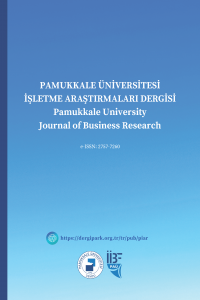Pandemi Sırasında Öğrencilerin, Öğretmenlerin ve Velilerin Çevrimiçi Öğretime Yönelik Algılanan Memnuniyeti
Memnuniyet, Öğretim, Çevrimiçi Öğretim, Pandemi, COVID-19
Perceived Satisfaction of Students, Teachers, and Parents During the Pandemic Towards Online Teaching
Satisfaction, Teaching, Online Teaching, COVID-19, Pandemic,
___
- Bergman, J., & Sams, J. (2012). Flip y our classroom: Reach every student in every c lass every day. Washington, DC: International Society for Technology in Education.
- Blumenstyk, G. (2015). American higher education in crisis: What everyone needs to know? Oxford, England: Oxford University Press.
- Cheng, J., & Koszalka, T. (2016). Cognitive flexibility theory and its application to learning resources. Retrieved from http://ridlr.syr.edu/publications/
- Harsasi, M., & Sutawijaya, A. (2018). Determinants of student satisfaction in online tutorial: A study of a distance education institution. Turkish Online Journal of Distance Education, 19(1), 89-99. doi: https://doi.org/10.17718/tojde.382732
- Hofer, S. I., Nistor, N., & Scheibenzuber, C. (2021). Online teaching and learning in higher education: Lessons learned in crisis situations. Computers in Human Behavior, 121, 106789.
- Ilgaz, H., & Gülbahar, Y. (2015). A snapshot of online learners: e-Readiness, e-Satisfaction and expectations. International Review of Research in Open and Distributed Learning, 16(2), 171-187.
- Kirtman, L. (2009). Online versus in-class courses: An examination of differences in learning outcomes. Issues in Teacher Education, 18(2), 103-116.
- Kurucay, M., & Inan, F. A. (2017). Examining the effects of learner-learner interactions on satisfaction and learning in an online undergraduate course. Computers & Education, 115, 20-37.
- Liguori E, Winkler C. (2020) From offline to online: Challenges and opportunities for entrepreneurship education following the COVID-19 pandemic. Entrepreneurship Educ Pedagogy., 3(4):346-51. doi: 10.1177/2515127420916738.
- Lister, M. (2014). Trends in the design of e-learning and online learning. Journal of Online Learning and Teaching, 10(4), 671-680.
- Martin, F., Sun, T., & Westine, C. (2020). A systematic review of research on online teaching and learning from 2009 to 2018. Computers & Education, 159, 104009.
- Muilenburg, L. Y. & Zane, L. B. (2007). Student barriers to online learning: A factor analytic study. Distance Education, 26(1) 29-48.
- Palloff, R.M., & Pratt, K. (2001). Lessons from the cyberspace classroom: The realities of online teaching. San Francisco: Jossey-Bass.
- Parahoo, S. K., Santally, M. I., Rajabalee, Y., & Harvey, H. L. (2016). Designing a predictive model of student satisfaction in online learning. Journal of Marketing for Higher Education, 26(1), 1-19. Doi: https://doi.org/10.1080/08841241.2015.1083511
- Spiro, R. J., & Jehng, J. C. (1990). Cognitive flexibility and hypertext: Theory and technology for the nonlinear and multidimensional traversal of complex subject matter. In D. Nix & R. J. Spiro (Eds.), Cognition, education, and multimedia: Explorations in high technology (pp. 163–205). Hillsdale, NJ: Lawrence Erlbaum.
- Spiro R. J., Coulson R. L., Feltovich P. J. and Anderson D. K. (1988) Cognitive flexibility theory: Advanced knowledge acquisition in ill-structured domains. Paper presented at the tenth annual conference of the cognitive science society. Hilldale, New Jersey: Erlbaum.
- Spiro, R. J., Feltovich, P. J., Jacobson, M. J., & Coulson, R. L. (1992). Cognitive flexibility, constructivism, and hypertext: Random access instruction for advanced knowledge acquisition in ill-structured domains. In T. M. Duffy & D. H. Jonassen (Eds.), Constructivism and the technology of instruction: A conversation (pp.57-76). Hillsdale, NJ: Lawerence Erlbaum Associates.
- Spiro, R.J., Feltovich, P.J., Gaunt, A., Hu, Y., Klautke, H., Cheng, C., Clemente, I., Leahy, S. and Ward, P. (2019). Cognitive Flexibility Theory and the accelerated development of adaptive readiness and adaptive response to novelty. In P. Ward, J. Schraagen, J. Gore, & E. Roth (Eds.), The Oxford handbook of expertise (pp. 951–976). Oxford: Oxford University Press.
- Spiro, R. J., Klautke, H. A., Cheng, C., & Gaunt, A. (2017). Cognitive fexibility theory and the assessment of 21st-century skills. In C. Secolsky & D. B. Denison (Eds.), Handbook on measurement, assessment, and evaluation in higher education (pp. 631–637). NY: Routledge
- Spiro, R., Vispoel, W., Schmitz, J., Samaragungavan, A., & Boerger, A. (1987). Knowledge acquisition for application: Cognitive flexibility and transfer in complex content domains. In B. K. Britton & S. M. Glynn (Eds.), Executive control processes in reading (pp. 177–199). Hillsdale, NJ: Lawrence Erlbaum.
- Tallent-Runnels M.K., Thomas J.A., Lan W.Y., Cooper S., Ahern T.C., Shaw S.M. & Liu X. (2006). Teaching courses online: a review of the research. Review of Educational Research, 76, 93–135.
- Tibi, M. H. (2015). Improving collaborative skills by computer science students through structured discussion forums. Journal of Technologies in Education, 10 (3-4), 27-41. doi:10.24059/olj.v22i1.995
- Turhangil Erenler, H. H. (2019). A structural equation model to evaluate students' learning and satisfaction. Computer Applications in Engineering Education, 28(2), 254-267. https://doi.org/10.1002/cae.22189
- Uusiautti, S., Maatta, K., & Leskisenoja, E. (2017). Succeeding Alone and Together-University Students' Perceptions of Caring Online Teaching. Journal of Studies in Education, 7(2), 48-66. doi: https:// doi.org/10.5296/jse.v7i2.11162
- Wang, C., Cheng, Z., Yue, X. G., & McAleer, M. (2020). Risk management of COVID-19 by universities in China. Journal of Risk and Financial Management, 13(2), 36. https://doi.org/10.3390/jrfm13020036
- Young, A., & Norgard, C. (2006). Assessing the quality of online courses from the students' perspective. The Internet and Higher Education, 9(2), 107-115. doi: https://doi.org/10.1016/j.iheduc.2006.03.001
- Başlangıç: 2014
- Yayıncı: Pamukkale Üniversitesi
Covid-19 Pandemi Döneminde Makroekonomik Değişkenlerin Konut Piyasasına Etkisi
Konut Seçimini Etkileyen Faktörlerin İncelenmesi: Balıkesir- Akçay Örneği
Bölgesel Kalkınma ve İnovasyon Sarmal Modelleri İlişkisi: Türkiye Örneği (2010-2019)
Hırpalanmış Kadın Sendromu: Çalışan Kadınlar Açısından Bir İnceleme
Türkiye’de Renal Replasman Tedavi Yöntemlerinin Geri Ödeme Kurumu Perspektifinden Maliyet Analizi
MACBETH Tabanlı Bulanık MARCOS Yöntemi ile Bir Tekstil İşletmesi için Ürün Grubu Seçimi
Türkiye'nin Vergi Yapısı: Edirne Değerlendirmesi
E-Ticaretin Vergilendirilmesi Sorunsalının Vergi Mevzuatı Açısından Analizi
Kur Korumalı Türk Lirası Mevduat Hesaplarının Muhasebeleştirilme Esasları
